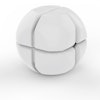Japan’s Kobe Steel has recently admitted to falsifying data related to the strength of some of its products – including aluminum and copper that’s been used in transportation applications like air, rail and automotive. Oops… and also maybe a SPACE ROCKET.
Bloomberg is reporting that Kobe has admitted to delivering products to as many as 200 companies where the materials did not meet the clients’ quality standards. A probe into Kobe’s plants describes the deception as “systematic,” with some instances of fake data going back as far as a decade.
Analysts point to high profile customers like Toyota, Honda and Subaru where costs could balloon out of control if Kobe is subject to more than just the replacement of parts. If recalls were initiated, or legal cases filed, the $133 million estimated for replacements could be just a drop in the bucket.
And it wouldn’t be surprising if this did occur, considering Toyota has already said that it has discovered materials that Kobe falsified in major vehicle design components like hoods and doors. Subaru has been producing wings for Boeing’s Dreamliner jets and, while Boeing says it hasn’t so far discovered a threat to the safety of its planes, it is still working through its investigation.
But back to this space rocket.
Mitsubishi Heavy Industries very recently used Kobe aluminum in the H-IIA rocket, which was just launched by Japan Aerospace Exploration Agency. Since Tuesday’s satellite launch was deemed a success, there are no current major concerns, though an investigation is also underway.
Japan’s Ministry of Economy, Trade and Industry is said to be tracking the case, but it doesn’t look good for the reputation of Kobe. It turns out that Shinko Wire, a Kobe Steel affiliate, had an incident last year where a unit “misstated data” relating to stainless steel wire strength, ultimately selling an alloy that didn’t meet industrial standards.






















